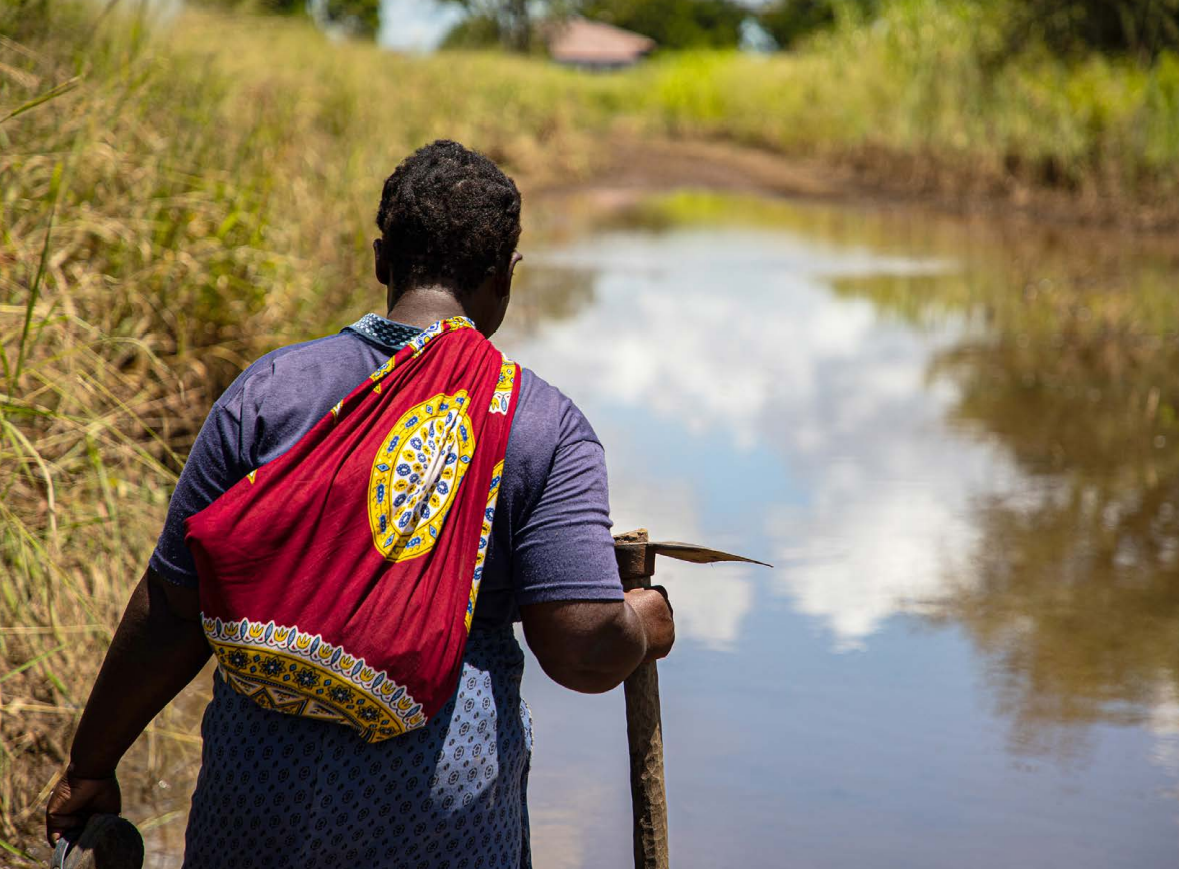Climate disasters have become increasingly frequent and intense, disproportionately affecting women, girls and marginalised communities in the Global South. In a world facing the escalating impacts of climate change, social protection has a crucial role to play in addressing climate-induced loss and damage, strengthening resilience, and advancing development goals. There is an urgent need for governments to expand social protection systems, and ensure that they address inequalities and fulfil human rights.
Many communities are dealing with crop losses due to erratic rainfall patterns. They may need to recover and rebuild after disasters such as cyclones, or take action in the face of slow-onset climate impacts such as rising sea levels and desertification. For vulnerable households with minimal economic buffers (which is often the situation for women- headed households) the loss of home, land, crops, food or livelihood as a result of climate-induced loss and damage can push people into spiralling poverty and destitution.
Social protection can make a huge difference to people’s lives as they deal with these challenges. Resilience to climate change relies on the ability of people and communities to cope with shocks and stresses. Social protection that ensures that people’s human rights are met – for example by providing help in the form of income support, unconditional cash transfers, employment guarantees and food support – can play a key role in helping vulnerable individuals – especially women – and communities to get through crises and avoid exacerbating poverty in the face of climate change. For some, it can mean the difference between being able to continue in agriculture, or facing debt, poverty and hunger that forces them to migrate in search of work and food.
In addition to being a tool for resilience and addressing climate-induced loss and damage, social protection systems can also deliver many more development benefits by addressing inequality, empowering marginalised people, and creating transformative opportunities for sustainable development. National social protection floors, which states have committed to under the Sustainable Development Goals (SDGs) and the human right to social security, can offer basic security for livelihoods and income for everyone over the whole of their lifetime, ensuring that no- one is left behind. Similarly, under the Convention on the Elimination of All Forms of Discrimination Against Women (CEDAW), provisions for maternity protection and child-care are proclaimed as essential rights and are incorporated into all areas of the Convention, whether dealing with employment, family law, health or education. Moreover, CEDAW calls for states to implement special measures to address the substantive inequalities that women face, and in recognition of the gender-blind nature of most policies. This clearly mandates States to ensure that, amongst other things, social protection policies are designed in gender-responsive ways that specifically seek to support and advance the rights of women.
If done well, social protection measures can be a critical way for States to fulfil their commitments to protect human rights and advance sustainable development, including through approaches that respond to and scale-up to address climate impacts and strengthen resilience as needed.
So far, however, only 29% of the world’s population are covered by the full range of social security benefits, most of whom are in the Global North. Only 45% of people are effectively covered by at least one social protection benefit and four billion people do not benefit from any form of social protection whatsoever.
Furthermore, few countries are using social protection to reduce climate-related hardships. Social protection is not yet being used at scale to prepare for the current and incoming climate crisis, and the disruption that is certain to result from increased floods, droughts, cyclones, rising sea levels, salination, forest fires, and the crop failures, disappearing fresh water sources, loss of livelihoods and migration that will result. Government efforts to respond to such crises tend to be ad-hoc, insufficient and gender- blind, which often means that the people in greatest need – women and marginalised communities – are the ones that fall through the cracks.
Addressing the multiple inequalities and disproportionate impacts faced by women, girls and marginalised communities must be central to addressing climate-induced loss and damage. Policies must make a specific effort to target women, otherwise they are likely to miss out on the support they need.
There is therefore an urgent need for governments to systematise and increase coverage of gender- responsive social protection systems that are accessible to all, and able to scale-up in the face of climate challenges.
The Covid-19 pandemic has shown the vital importance of social protection schemes to prevent deepening poverty when crises strike, and key lessons can be learned from this response. Not least, the pandemic has exposed and exacerbated the huge inequalities faced by women, youth and informal sector workers; and there is a growing realisation that coverage must expand rapidly, to better prepare for future crises.
Social Protection is increasingly seen as a tool for addressing climate-induced loss & damage, and is scheduled for discussion under the UN Framework Convention for Climate Change (UNFCCC) Warsaw International Mechanism for Loss and Damage (WIM) and its Technical Expert Group on Comprehensive Risk Management (TEG-CRM). National governments and the international community, particularly under the WIM must move forward an agenda to scale up climate-proofed social protection systems, and to ensure that they are adequately financed through measures including international climate finance, debt relief and progressive taxation.
This briefing aims to make the case for the kinds of social protection schemes that can most effectively respond to loss and damage needs. It outlines how gender-responsive systems of social protection and the various tools and policies that they include can help to deliver a human-rights based approach to sustainable development while minimising and addressing climate-induced loss and damage.
First published at: RosaLux Southeast Asia | Working for a fair society (rosaluxhanoi.org)
